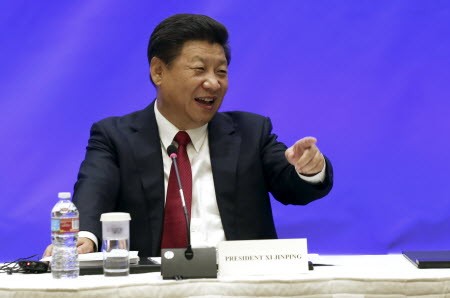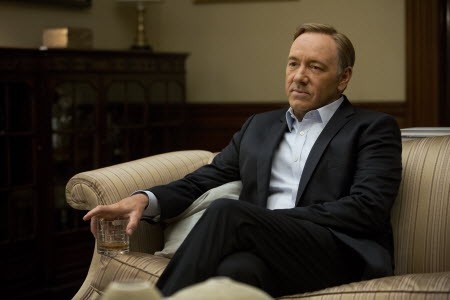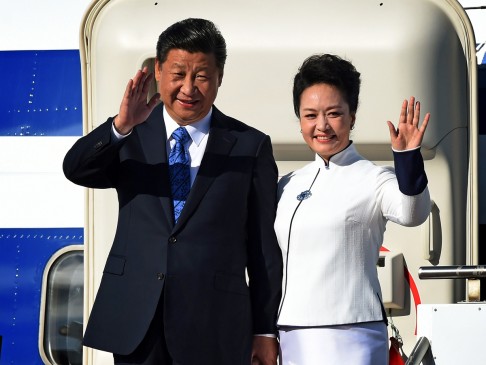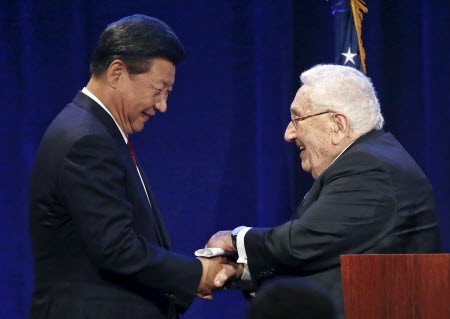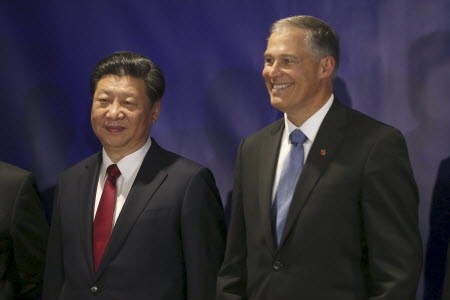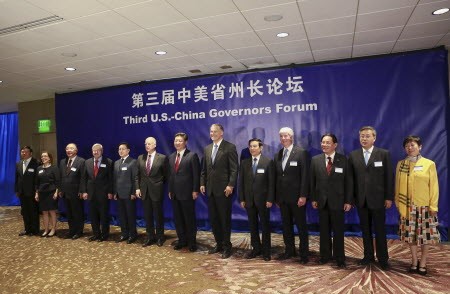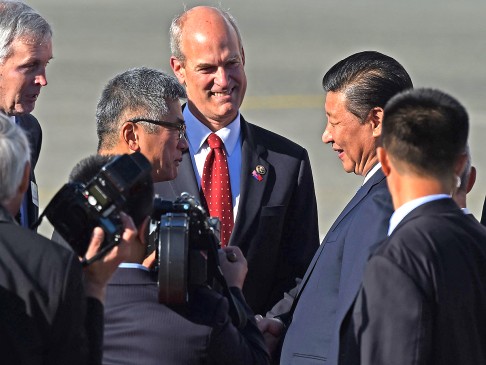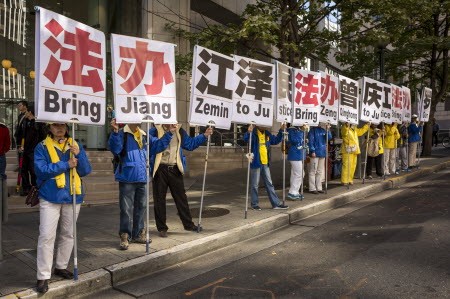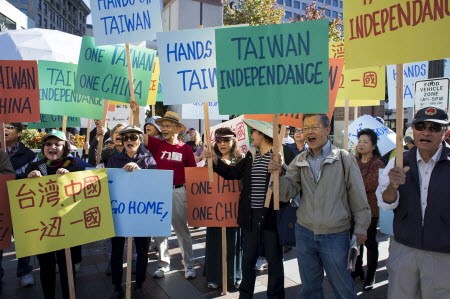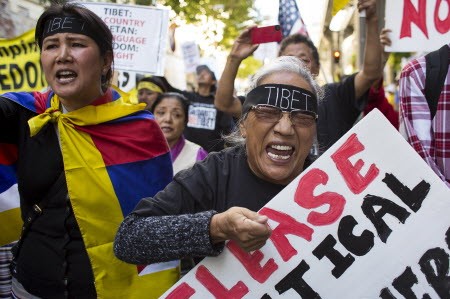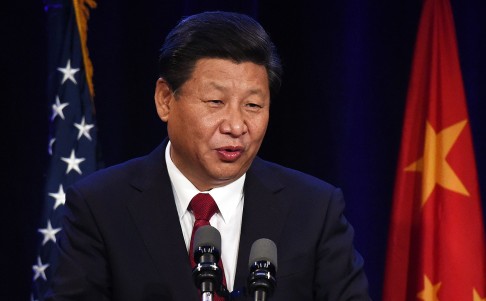
There is no ‘House of Cards’: China’s president rejects for first time claims anti-graft crackdown is power struggle
Hours after landing in Seattle on his first state visit in the US, Xi made a surprising reference to the popular American political drama series House of Cards, starring Kevin Spacey as ruthless and power-hungry US President Francis Underwood.

Chinese President Xi Jinping surprised observers today by publicly dismissing for the first time festering allegations that his sweeping anti-corruption crackdown is driven by a power struggle, during his landmark speech in Seattle.
Speaking at the Washington State Welcoming Banquet on the first day of his week-long visit to the US, a confident and assertive Xi spoke about a spate of issues concerning his American audience, from cyber security, China-US relations, to the economy, addressing former US Secretary of State Henry Kissinger, Microsoft co-founder Bill Gates and other high-profile guests at a formal banquet.
But it was comments on his high-profile anti-corruption drive which raised the most eyebrows, as Xi sought to stamp down speculation and allegations from China-watchers that his crackdown is motivated by an internal power struggle that allows him to get rid of political opponents and consolidate power.
In a surprising reference to the popular American political drama series House of Cards, starring Kevin Spacey as ruthless and power-hungry US President Francis Underwood, Xi said “We have punished tigers and flies. It has nothing to do with power struggles. In this case there is no 'House of Cards'.
China’s senior graft buster and state media have refuted the power struggle claim, but it is the first time that Xi himself has publicly denied it.
Zhao Hongzhu, deputy head of China’s top graft watchdog the Central Commission for Discipline Inspection, wrote in party mouth piece People’s Daily in March that overseas parties who said anti-corruption is a tool for power struggle were driven by “ulterior motives.”
Later in March, an official Wechat account of the overseas edition of the People’s Daily published an article titled “The True Reasons behind Xi Jinpnig’s Strong-hand Anti-corruption Campaign,” accusing overseas media reports labeling Xi’s anti-graft campaign as “internal power struggle” of selective reporting and holding prejudice against the CPC.
In 2012, as General Secretary of the Communist Party, Xi launched the unprecedented anti-graft campaign bringing down hundreds of “tigers” and “flies” – a reference to many senior officials and lower-ranking cadres suspected of corruption across various sectors of the party, government, military and the state-owned enterprises.
Among the “tigers,” are formal security tsar and Politburo standing committee member Zhou Yongkang, former presidential aide Ling Jihua and former vice-chairmen of the Central Military Commission Guo Boxiong and Xu Caihou.
Xi and his top graft-buster Wang Qishan have vowed to continue the relentless campaign, and have often stressed the arduous mission ahead to contain the spread of corruption. Party leaders are even considering introducing a code of conduct for senior cadres, according to retired vice-president of the Central party School Li Junru.
Last week, Wang, who has shown little public optimism about the campaign, made an unusually upbeat assessment of his efforts, telling Vietnam’s Deputy Prime Minister Nguyen Xhan Phuc that “the working style of the [Communist] Party is improving, the spread of corruption is being contained."
Corruption aside, Xi also used his speech to call for better relations with the US and warned that conflict between the two countries could be a 'disaster' for the world. “We want to see more understanding and trust and less estrangement and suspicion... Should they enter into conflict and confrontation, it would lead to disaster for both countries and the world at large,” Xi said.
Both sides must read each other’s strategic intentions correctly to avoid misjudgments and fostering a deeper understanding of each other's agendas would help “forestall misunderstandings and miscalculations,” he added. “(Our understanding) should be based on facts, lest we become victims of hearsay".
Xi also revealed in his speech that China was ready to set up a high-level mechanism with the US to fight cyber crime and insisted his nation was a victim of hacking and not an instigator. As well as cyber security, he said the two countries could cooperate on a wide range of issues including trade, clean energy, law enforcement, and infrastructural developments.
“China is a strong defender of cyber security but it is also a victim of hacking. China will never engage in commercial cyber theft or encourage or support anyone for doing so," Xi explained.
"Both commercial cybertheft and hacking against a government’s networks are crimes that must be punished in accordance with law of relevant international treaties. The international community should, on the basis of mutual respect, and mutual trust, work together to build a peaceful, secure and cooperative cyberspace", he added.
On the economy, Xi defended China’s recent move to intervene following August's stock market turmoil saying the moves had successfully prevented panic and set the nation on a steady course for recovery. The president also told the audience that China was committed to reform and pledged to give fair treatment to foreign companies in China.
He also highlighted China had no intention to build its spheres of influence through initiatives such as One Belt One Road or Asia Infrastructure Investment Bank.
Above all, he pledged that China would continue its policy of aggressive development to help more people “live a better life.” He discussed the poverty he saw in rural villages in his country as a younger man and how China’s rapid economic expansion had lifted millions out of poverty.
Just hours before the speech, the president, along with Chinese and American officials signed an agreement to cooperate on boosting businesses that create renewable and clean energy.
The US and Chinese officials touted their local efforts at reducing carbon emissions, including promoting solar and other renewables, low-carbon transportation standards, energy efficiencies and research into clean technologies.
The trip is Xi's first state visit to the US since becoming Chinese president in 2013.
With economic issues high on his agenda, Xi is due to meet leading businesspeople from both China and US to strengthen ties and reassure investors that China's economy is stable and open for business.
In an interview published Tuesday in the Wall Street Journal, Xi depicted China and the United States leading the world shoulder-to-shoulder, with both common and competing interests.
“Together, China and the United States account for one-third of the world economy, one-fourth of the global population, and one-fifth of global trade,” he said. “If two big countries like ours do not cooperate with each other, just imagine what will happen to the world.”
Xi was welcomed in Seattle shortly after midnight Hong Kong time by a group that included Washington Governor Jay Inslee, former Washington governor and US ambassador to China Gary Locke and Seattle Mayor Ed Murray.
In Seattle, supporters turned out to welcome the Chinese president and other dignitaries traveling in his motorcade. Wendy Hu, a native of Guangdong Province who has lived in Seattle for 20 years, brought her 11-year-old daughter, Anna Ni. “China and the U.S. are good partners now, with Boeing and Microsoft,” Hu said. “I love both countries.”
Hundreds of protesters from the religious group Falun Gong demonstrated outside the federal courthouse, holding banners and banging drums as the motorcade passed. Falun Gong says its members are persecuted in China.
“It’s about compassion and tolerance,” said Sabrina Chang, 28, who traveled to Seattle with other Falun Gong practitioners for the protest.
During his three-day visit at the northwest US city, Xi plans visits to Boeing’s Everett factory at Paine Field airport, Microsoft’s campus in Redmond, and a high school in Tacoma - sister city to the Chinese port of Fuzhou.
In 1994, as a leader in Fuzhou, Xi signed the sister-city agreement between the ports.
The Paulson Institute, in partnership with the China Council for the Promotion of International Trade, will co-host a US-China Business Roundtable. Xi will make his only major speech while in the country, where 30 business executives will be presented.
Chinese state broadcaster CCTV reported that Xi is expected to hold talks with the CEOs of Apple, Microsoft and IBM. He’s also set to attend a private dinner at the home of Bill Gates.
In lavishing attention on Seattle, Xi follows in the footsteps of three other Chinese presidents: Deng Xiaoping, Jiang Zemin and Hu Jintao.
“We know the value of international trade and we know the value of exports to China and how many thousands of good-paying jobs it supports here in the state of Washington,” Gary Locke, a former Washington governor and ex-US ambassador to China, told the Agence France-Presse.
While Xi focuses on business relations, Washington sees different priorities in the visit.
Obama has threatened sanctions on Chinese officials over concerted efforts by Chinese hackers to steal secrets and intellectual property from US businesses.
To highlight what Washington thinks about Beijing’s tough new national security laws, White House National Security Advisor Susan Rice on Tuesday hosted US non-governmental groups likely to be hurt.
One US official said those groups are worried about their long-term presence in the country. Everything from universities to rights groups would be affected should the draft law go into force.
In addition, the US is seeking more information about an American businesswoman, Sandy Phan-Gillis, who has been held by Chinese security services for six months accused of being a spy, but whose case only became public on Tuesday.
White House spokesman Josh Earnest said it was “disconcerting” that they have not been able to get answers to their questions.
Xi will be leaving for Washington to meet Barack Obama on Thursday.
Between September 26 and 28, Xi will attend a series of events at the United Nation in New York. He is expected to speak at the 70th anniversary session and make his debut speech at the United Nation's General Assembly.
Associated Press, Agence France-Presse
